Acer Aspire S7 Ultrabook: Acer’s Best Foot Forward
by Jarred Walton on January 7, 2013 4:30 AM EST- Posted in
- Laptops
- Acer
- Intel
- Ivy Bridge
- Aspire S7
- Ultraportable
- Ultrabook
Battery Life and Thermals
With the performance aspects out of the way, let's turn to battery life. I have to say, I've run more battery tests on the Acer S7 than perhaps on any other laptop in recent history. It's not that it needed extra testing, but as the first Windows 8 laptop in our labs I wanted to look at changing some of the tests. We discussed things among the various editors, and I worked to come up with some redesigned, hopefully better battery life tests.
First on the chopping block is the idle battery life test; rarely do people use workloads that are so light that it's meaningful to look at pure idle battery life, and going to the extreme of muting the volume and turning off WiFi is more than most are willing to do. We've decided to move to our Internet test as the baseline measurement, since it's representative of a moderate workload that conceivably might be used while running a laptop on battery power. With moderate Internet surfing (we load four pages every minute, simulating time for reading) as our light workload, for our heavy workload we crank up the frequency of page loads (the same pages, only loading every 10 seconds now) and add in playback of a bunch of 128kbps MP3 audio files. Finally, for our heavy workload we keep the Internet portion of the moderate testing but add in looped playback of a 1080p H.264 encoded video and have a constant 1Mbps download running from a local server.
With this being the first laptop to use our new Windows 8 test suite, we're in a bit of a state of flux so I've run both the new battery tests along with the old Windows 7 era tests (only with IE10 instead of IE8/9). I also ran a few other battery life tests just for reference: the three PowerMark tests. We're a little hesitant to use PowerMark as a standard, simply because it's limited to Windows platforms and has the potential to encourage optimizations for a benchmark as opposed to general optimizations; as you'll see, however, there's plenty of overlap between our tests and the results from PowerMark.
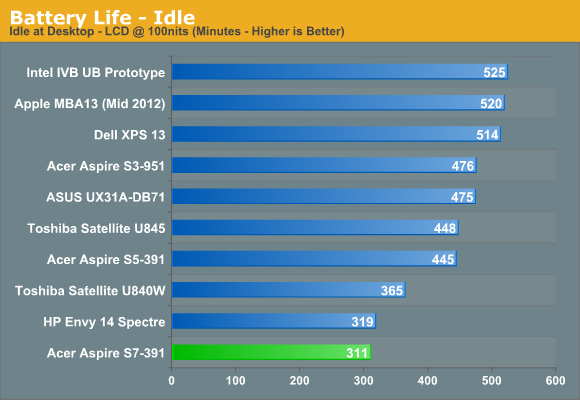
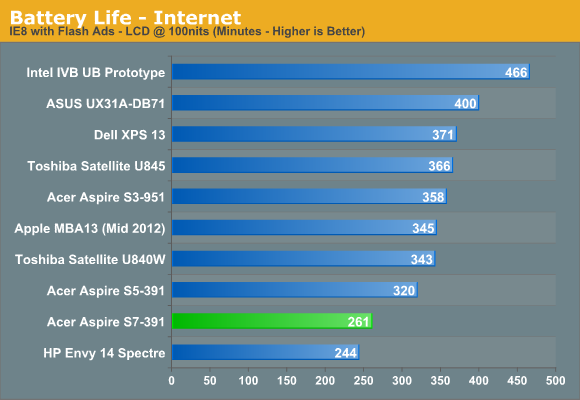
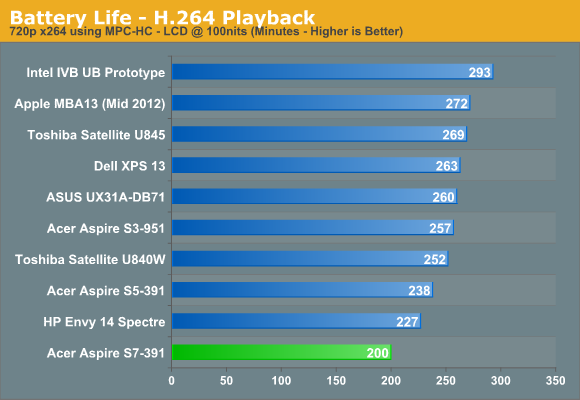
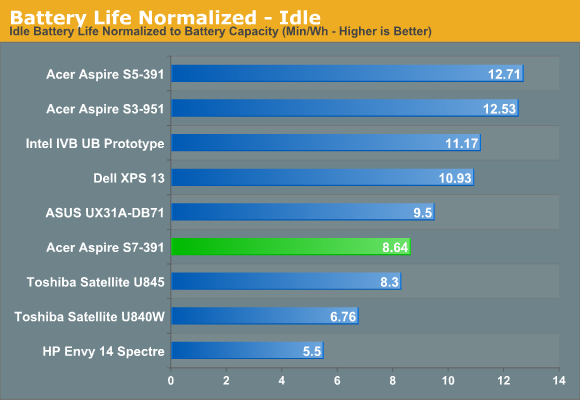
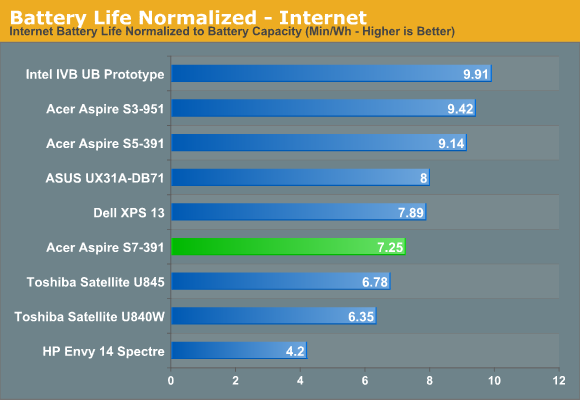
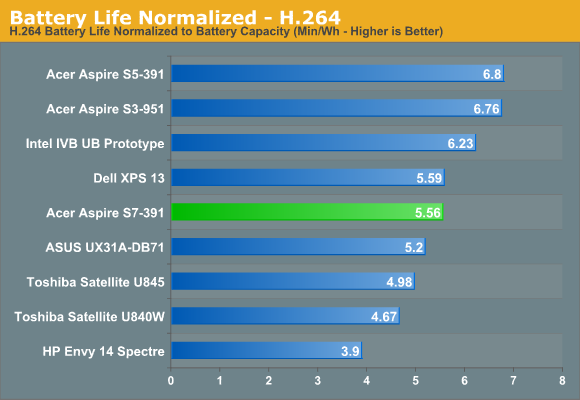
Starting with our older 2012 battery benchmarks, the Aspire S7 has a pretty poor showing. The 35Wh battery is the same capacity as the previous generation Aspire S5, and yet battery life is down substantially in all three tests. Whatever Acer (or Microsoft) has done in the past six months has not been helpful in this area. Normalizing for battery capacity does improve the situation a bit, but where it’s enough to move Acer past the two Toshiba Ultrabooks and the HP Envy 14, that’s not saying a lot—and higher battery capacities do count for something. The bottom line is that best-case, we were able to get just over five hours of running time out of the Aspire S7. Let’s look at some other results.
| Acer Aspire S7 Additional Battery Tests | ||
| Battery Test |
Run Time (Minutes) |
Normalized (Min/Wh) |
| AnandTech 2013 Light | 240 | 6.86 |
| AnandTech 2013 Medium | 173 | 4.94 |
| AnandTech 2013 Heavy | 137 | 3.91 |
| PowerMark Productivity | 255 | 7.29 |
| PowerMark Balanced | 201 | 5.75 |
| PowerMark Multimedia | 172 | 4.91 |
Note that in the above tests, we’re using 200 nits for our 2013 test suite while PowerMark specifies 110 nits as their desired brightness level. Our Light test result is down 21 minutes from our previous Internet test result, most likely due to the increased LCD brightness. Elsewhere, our new Medium test drops us below the three hour mark, and our Heavy test is getting close to lasting only two hours. It’s not really realistic to expect a full day of use from a laptop when you’re going full-tilt the whole time, but considering the CPU load is only around 10-35% even in our Heavy test, we’re not pushing things that hard.










53 Comments
View All Comments
cknobman - Monday, January 7, 2013 - link
Hard to sell at such a high price when your competitors sell comparable (or better) items $500+ cheaper.The Asus UX31A is one of my favorites right now. 1080p touch screen, all aluminum build, core i5, 128gb SSD and
UNDER $1100!!!!!!!!!!!!!!!!!!!!!!!!!
I am toying with getting this right now from best buy: http://www.bestbuy.com/site/Asus+-+Ultrabook+13.3%...
Zanegray - Monday, January 7, 2013 - link
I have a ux31a-ab71 (same as db71 except a smaller ssd) and I LOVE the thing. I don't care for Windows so I put Linux on it and find it my favorite computing device. Under my usage the battery also last for 2 to 3 days at a time. It is snappier than I ever expected and the aluminum case is awesome looking.To summarize... It's just plain sexy.
Paid just over 1000 dollars for it on black Friday too :-)
ironargonaut - Monday, January 7, 2013 - link
Is an IPS screen that fantastic on a 14in laptop that I should pay $700 more?kyuu - Monday, January 7, 2013 - link
You're not paying $700 for the IPS screen.drjacko - Monday, January 7, 2013 - link
Original: "I can’t understate how impressively thin this thing is"But the article is very good as a review as well as a commentary of the path taken by Acer.
Would you have considered a side by side shots against MB counterparts and previous version of Acer's ultrabook?
rarson - Monday, January 7, 2013 - link
For the life of me, I can't understand why someone would want one of these over a normal laptop. Am I the only person who cannot stand ultra-thin (and ultra-flimsy) notebooks? I feel like I'm going to break the thing just by opening it up. A crappy keyboard, touchscreen, and absurd pricing makes this about as useful as a Surface tablet. Which is to say, pretty f#&@ing useless.Even if you do like the ultra-thin junk, I still don't see why you'd want to pay such a premium for a touchscreen on a laptop, although I suppose when your keyboard is that crappy, you'll be yearning for some other kind of input device.
If I want a consumption device, I'll buy a Nexus tablet or similar. If I want a computing device, then I'll buy a regular laptop. For the price of one of these, I could buy one of each and STILL save a chunk of change.
kyuu - Monday, January 7, 2013 - link
1) These devices are not "ultra-flimsy", despite being very thin. If you "feel" like you're going to break it, that's your problem. You remind me of my grandmother arguing that you have to drive a gigantic Oldmobile or an SUV to be safe because smaller cars don't "seem" like they could be as safe.2) If you don't see the value proposition in a device like this, then obviously it's not for you. I don't see the value proposition in buying a Mercedes, for example, but that doesn't mean they shouldn't be built.
Tech-Curious - Monday, January 7, 2013 - link
To be fair, your grandmother is right: all else being equal, a lighter car is less safe, possibly a lot less safe depending on the particulars.AnnoyedGrunt - Tuesday, January 8, 2013 - link
Except that all else isn't equal, is it? Cars today are much, much safer than they have ever been, and even a small, modern car would be much safer than Granny's Oldsmobile.As far as the ultra-thin laptops go, I'm not a huge fan, but I can understand how someone who travels would really like the smaller, more portable size. My wife has a Macbook Pro 15 (non-retina), and I have a Dell Precision M4600 for work, and those are reasonable sizes for me.
This Acer is interesting, very similar in cost to a Macbook Air, but with better specs in most areas. However, one thing the Macs have done MUCH better than Windows laptops is make the touchpad useful. I don't know if it's a combination of OSX and hardware, or better drivers, or what, but it is so much easier to use the touchpad on my wife's Macbook than the one on my Dell (and any other Windows laptop I've used). I don't feel the need to use a mouse on the Mac, but on the Dell I always feel handcuffed without it (and this is for things like MS Office, web browsing, etc.).
I would have liked to see some Macbook Air battery life results and performance results, since I feel that is one of the biggest competitors for the Acer.
Ovreall I'm happy to see some in the PC industry making products that move in the direction of quality rather than price. Once you get to the point where the price isn't as much of an issue (especially for something you'll be using for 4-5 years) the enjoyment of using something that has high-quality interface points (monitor, keyboard, etc.) quickly overcomes the cost difference. Still would prefer something a bit thicker with a better keyboard and more battery life, though.
-AG
Tech-Curious - Tuesday, January 8, 2013 - link
As to your first comment, I don't know that that's universally true. Sure, in general, a modern car will have safety advantages an older car doesn't -- but size does matter: Is a 2013 Smart Car as safe as granny's Oldsmobile? Not a chance. All the airbags in the world can't compensate for the loss of mass.Even today, there are significant differences in mass within the same class of car. So if you have a choice between otherwise analogous vehicles, choosing the heavier one is (generally) safer.
The heavier option is probably also less fuel efficient, though, so like everything else, it's a trade-off.
As to the rest, I have to agree.